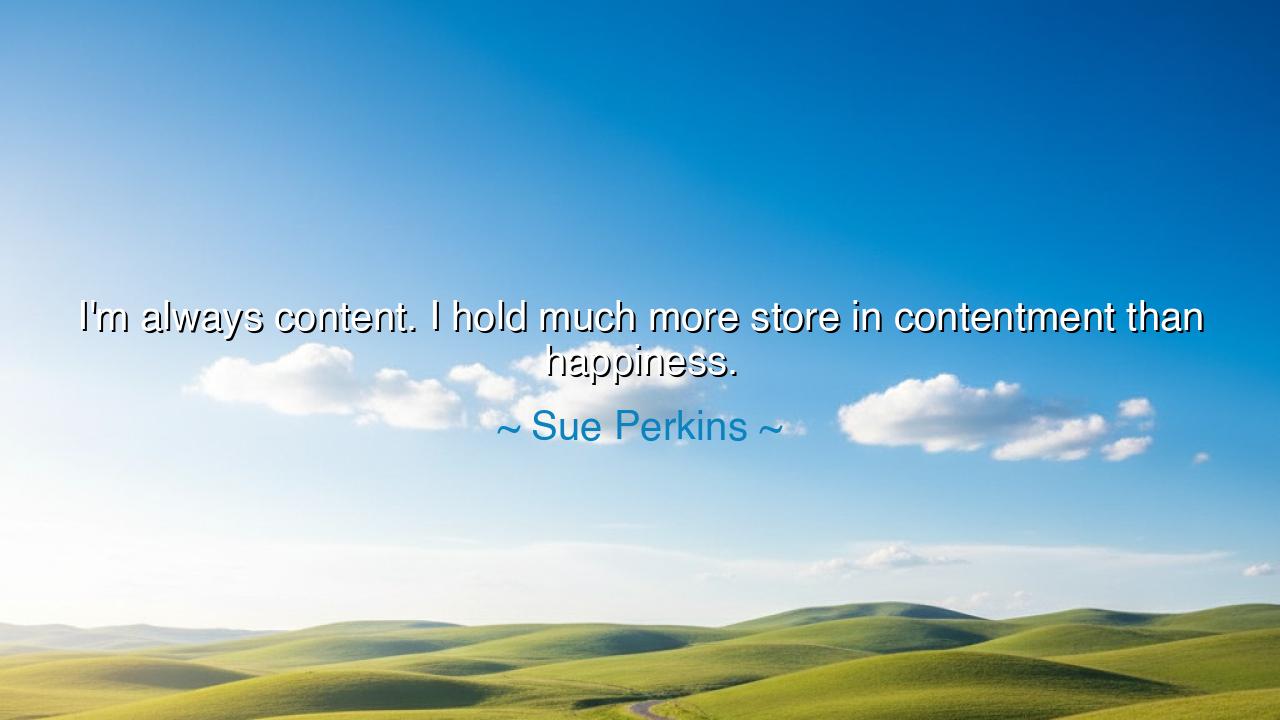
I'm always content. I hold much more store in contentment than






The words of Sue Perkins, “I’m always content. I hold much more store in contentment than happiness,” ring like a quiet bell amidst the noise of the modern age. They are not the words of one chasing life’s fleeting pleasures, but of a soul that has learned the deeper rhythm beneath them. In this simple statement lies an ancient truth: that contentment is the enduring flame, while happiness is but the spark. Happiness rises and falls like the tide—wild, bright, and passing—but contentment is the deep current that carries the spirit when the waves grow still. To hold “more store in contentment than happiness” is to seek peace over passion, steadiness over storm, and wisdom over the world’s illusions of joy.
The origin of this wisdom stretches far before Sue Perkins ever spoke it. From the earliest days of philosophy, sages and seekers have drawn the same line between contentment and happiness. The Stoics of Greece—men like Seneca and Epictetus—taught that happiness depends on fortune, while contentment depends on virtue. Happiness may come from victory, wealth, or affection; but contentment springs from acceptance, from harmony between desire and reality. The Buddhists, too, echoed this truth, teaching that the root of suffering lies in craving, and that peace arises only when craving ends. To be content, therefore, is to dwell in freedom—to want nothing more than the moment itself, and to trust that it is enough.
In Sue Perkins’ words, we hear the echo of those timeless teachings. She is not rejecting happiness, but seeing through its impermanence. To “always be content” is not to be numb or indifferent—it is to live with gratitude, to find satisfaction even in the ordinary. Contentment is not a denial of emotion, but a mastery of it. It is the art of resting the heart where it stands, instead of chasing joy like a mirage that vanishes when grasped. The contented person is like a tree rooted deep in the soil—winds may shake its branches, but its peace remains unbroken.
Consider the story of Marcus Aurelius, emperor of Rome, who ruled not only nations but himself. Amidst wars, betrayals, and the weight of empire, he wrote in his Meditations: “Very little is needed to make a happy life; it is all within yourself, in your way of thinking.” Though surrounded by luxury, he found his serenity not in power, but in perspective. His happiness was not the laughter of the banquet hall, but the quiet strength of self-command. Like Sue Perkins, he sought not the intoxication of delight, but the enduring stillness of contentment—a state no emperor nor beggar could take away.
The difference between happiness and contentment is the difference between momentary sunlight and eternal dawn. Happiness dazzles, contentment nourishes. Happiness depends upon circumstance—weather fair or foul, fortune high or low—but contentment belongs to the soul that has learned to find beauty in both. The one who chases happiness is like a traveler running after a rainbow; the one who cultivates contentment sits beneath it and marvels. For what use is joy if it disappears when life turns difficult? The wise seek the joy that abides even in sorrow—the quiet knowledge that every breath, every sunrise, every chance to love or learn, is itself enough.
This wisdom bears a powerful lesson for our restless age. We live in a world that prizes stimulation over peace, pleasure over patience. We are told to chase excitement, to measure our worth in smiles and thrills. Yet true strength lies not in constant joy, but in quiet endurance. To be content is to refuse the tyranny of “more”—to look at one’s life and say, “This, too, is sufficient.” Such a heart cannot be broken by loss, nor shaken by comparison, for it knows that life’s value is not in what it lacks, but in what it already holds.
So, my listener, take Sue Perkins’ wisdom into your own heart. Seek not only to be happy, but to be content—to live with gratitude for what is, rather than yearning for what might be. Practice stillness when the world shouts for more; savor the ordinary as the extraordinary gift it truly is. Let joy come when it will, but do not cling to it; let peace dwell even when joy departs. For happiness is a guest, but contentment is a home—and the soul that builds its house upon that foundation shall never wander lost in the storms of life.
Thus, the teaching is eternal: be as the calm river, not the crashing wave. Cherish contentment, for it is the crown of the wise, the solace of the weary, and the quiet melody that endures long after the laughter fades.






AAdministratorAdministrator
Welcome, honored guests. Please leave a comment, we will respond soon